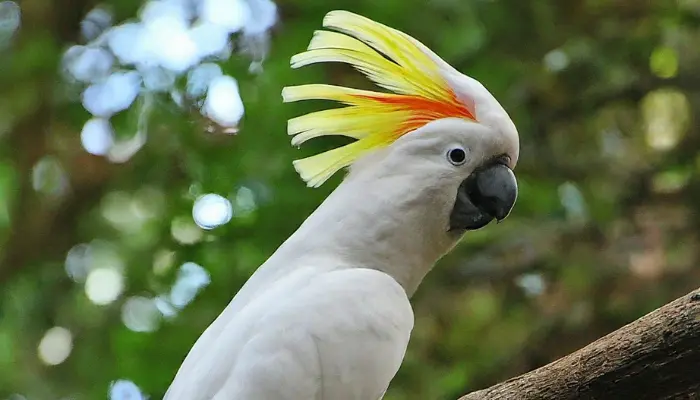With its flamboyant crest, striking white plumage, and charismatic personality, the umbrella cockatoo (Cacatua alba) stands as a captivating icon of the avian world. Endemic to the rainforests of Indonesia and nearby islands, this majestic parrot species has enamored bird enthusiasts worldwide. These bired known for its intelligence, sociability, and vocal prowess. The umbrella cockatoo fascinates both experienced aviculturists and casual observers alike. In this article, we will discuss umbrella cockatoo’s unique characteristics, behavior, and the joys and challenges of keeping one as a companion bird.
Origin and History of Umbrella Cockatoo
The history of the Umbrella Cockatoo (Cacatua alba) intertwines with tales of exploration, trade, and fascination with exotic avian species. Indigenous to the tropical rainforests of Indonesia and nearby islands. The Umbrella Cockatoo has long captured the imaginations of bird enthusiasts and explorers alike. Its name originates from the distinctive appearance of its crest, which, when fully extended, resembles a canopy or umbrella.
While its exact discovery by Westerners remains unclear, historical records suggest that Dutch and Portuguese traders encountered these majestic birds during their voyages to the East Indies in the 16th and 17th centuries. Since then, the Umbrella Cockatoo has journeyed across continents, captivating hearts with its intelligence, charm, and affectionate nature.
In this exploration of the origin and history of the Umbrella Cockatoo, we uncover the fascinating journey of this iconic parrot species from its native habitats to becoming beloved companions in households around the globe.
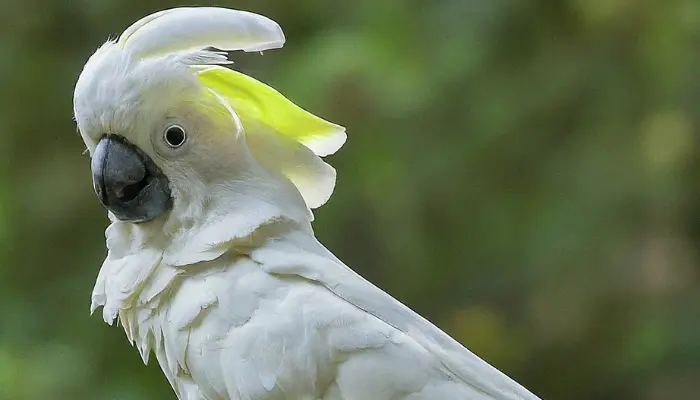
Scientific Classification of Umbrella Cockatoo
The Umbrella Cockatoo belongs to the following scientific classification.
| Kingdom |
Animalia |
| Class |
Aves (Birds) |
| Family |
Cacatuidae |
| Scientific Name |
Cacatua alba |
| Common Name |
Umbrella Cockatoo |
| Bird Size |
The Umbrella Cockatoo is a medium-sized cockatoo, typically measuring around 45 to 50 centimeters (18 to 20 inches) in length. |
| Feather Color |
The plumage of the Umbrella Cockatoo is mostly white, with vibrant yellow crest feathers. They have a distinct crest that can be raised or lowered, resembling an umbrella when fully extended. |
| Crest Color |
The crest of the Umbrella Cockatoo is typically yellow, adding to its striking appearance. |
| Lifespan |
Umbrella Cockatoos have a relatively long lifespan, often living between 60 to 80 years in captivity with proper care. |
| Price Range |
|
This classification system categorizes the Umbrella Cockatoo within the broader group of animals, chordates, birds, parrots, cockatoos, and specifically within the Cacatua genus and alba species.
Umbrella Cockatoo Colors and Marking
Umbrella Cockatoos are stunning birds known for their striking appearance and charming personalities. Here are some details about their colors and markings,
- White Plumage: The most prominent feature of Umbrella Cockatoos is their pure white feathers covering most of their body. This white plumage extends from their crest down to their tail feathers.
- Yellow Crest: They have a prominent, large, and expressive crest on top of their head, which they can raise or lower depending on their mood. The underside of the crest is typically yellow.
- Peachy-Pink Patches: Some Umbrella Cockatoos have peachy-pink patches of bare skin on their cheeks. These patches can flush pink when the bird is excited or agitated.
- Black Beak and Feet: Their beak and feet are usually black, which provides a striking contrast against their white plumage.
- Dark Eyes: Their eyes are dark and can be quite expressive, reflecting their emotions.
- Sexual Dimorphism: There’s minimal sexual dimorphism in terms of plumage coloration, with both males and females exhibiting similar appearances. However, behavioral differences may be observed between genders.
- Molting: Like other birds, Umbrella Cockatoos undergo molting, during which they shed old feathers and grow new ones. Molting patterns can vary among individuals.
- Variations: While the general description applies to most Umbrella Cockatoos, variations in color intensity and pattern can occur among individuals.
Overall, Umbrella Cockatoos are famous for their beauty and are popular pets among bird enthusiasts. However, they require dedicated care and attention due to their social nature and potential for long lifespans.
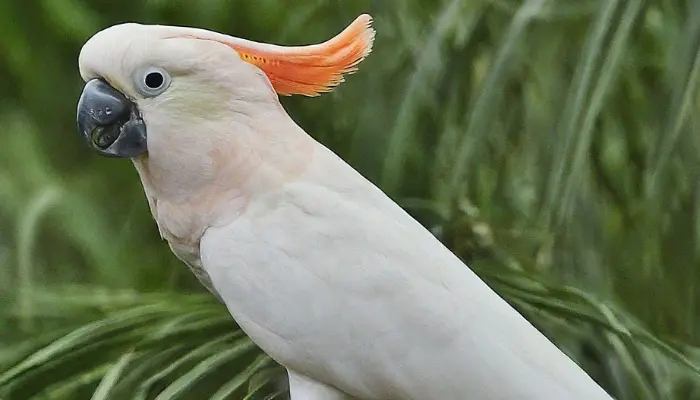
Caring Tips for Umbrella Cockatoo
Umbrella cockatoos are beautiful and intelligent birds that require specific care to thrive. Here are some essential care tips.
- Large Cage: Provide a spacious cage for your umbrella cockatoo. They need room to move around, stretch their wings, and play. The cage should be large enough to accommodate toys, perches, and food/water dishes.
- Nutritious Diet: Offer a balanced diet consisting of high-quality pellets, fresh fruits, vegetables, nuts, and seeds. Avoid feeding them avocado, chocolate, caffeine, and salty or sugary foods as they can be toxic to birds.
- Hydration: Always ensure fresh, clean water is available for your cockatoo. Change the water daily to prevent contamination.
- Socialization: Cockatoos are social birds and need regular interaction and attention from their owners. Spend time playing, talking, and bonding with your cockatoo daily.
- Toys and Enrichment: Provide a variety of toys, including chewable toys, puzzles, and swings, to keep your cockatoo mentally stimulated and prevent boredom.
- Grooming: Trim your cockatoo’s nails and wings regularly to prevent injury and ensure they are comfortable. You may need to consult a vet or a professional for this, especially if you’re unsure how to do it safely.
- Clean Environment: Keep the cage clean by regularly removing droppings, leftover food, and replacing bedding. This helps prevent the spread of diseases and keeps your cockatoo healthy.
- Veterinary Care: Schedule regular check-ups with an avian veterinarian to monitor your cockatoo’s health and address any potential issues early on.
- Consistent Routine: Establish a consistent daily routine for feeding, playtime, and sleep. Cockatoos thrive on routine and may become stressed if their environment is unpredictable.
- Respect and Patience: Respect your cockatoo’s boundaries and give them space when needed. Patience is key when building trust and forming a bond with your bird.
By following these care tips and providing a loving environment, you can ensure that your umbrella cockatoo lives a happy and healthy life.
Common Health Problems of Umbrella Cockatoo
Umbrella Cockatoos like all pet birds can be prone to certain health problems. Here are some common health issues seen in umbrella cockatoos.
- Psittacosis (Parrot Fever): This is a bacterial infection caused by Chlamydia psittaci. It can cause respiratory issues, lethargy, loss of appetite, and other symptoms.
- Feather Plucking: Cockatoos are known for their tendency to pluck their own feathers due to stress, boredom, or health issues. Identifying and addressing the underlying cause is crucial.
- Nutritional Deficiencies: Inadequate diet can lead to deficiencies in essential nutrients like calcium, vitamin A, and vitamin D, resulting in various health problems including weak bones, beak and feather abnormalities, and immune system issues.
- Aspergillosis: This is a fungal infection caused by Aspergillus spores found in damp, moldy environments. It can affect the respiratory system and lead to breathing difficulties and other respiratory symptoms.
- Bacterial and Fungal Infections: Cockatoos are susceptible to various bacterial and fungal infections, especially if their living environment is not kept clean.
- Obesity: Overfeeding and lack of exercise can lead to obesity in cockatoos, which can predispose them to other health issues such as fatty liver disease and joint problems.
- Behavioral Problems: Cockatoos are highly intelligent and social birds. If they are not provided with enough mental stimulation and social interaction, they may develop behavioral problems such as aggression, screaming, or self-mutilation.
- Avian Bornavirus (ABV): This virus can cause a variety of neurological symptoms in infected birds, including seizures, weakness, and abnormal behaviors.
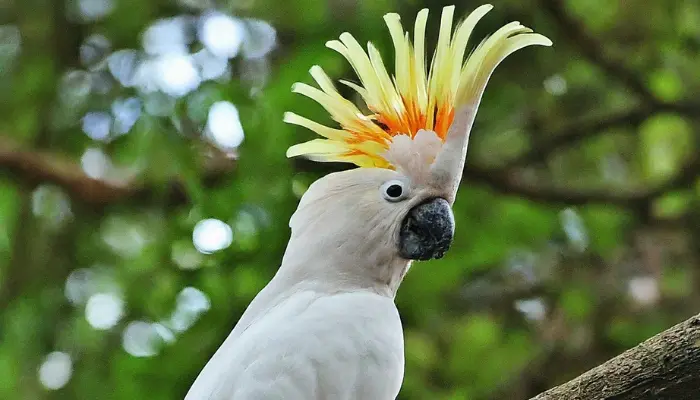
Best Diet for a Umbrella Cockatoo
Ensuring your umbrella cockatoo’s diet is well-balanced is crucial for its health and well-being. Here is a guide to a balanced diet for your feathered friend.
- Pellets: High-quality pellets should form the foundation of your cockatoo’s diet. Look for pellets specifically formulated for cockatoos, as they contain essential vitamins and minerals. Pellets provide balanced nutrition and are designed to meet most of your bird’s dietary needs.
- Fresh Fruits: Offer a variety of fresh fruits daily. Cockatoos enjoy fruits like apples, bananas, grapes, oranges, berries, and melons. These provide essential vitamins and minerals and add variety to their diet.
- Fresh Vegetables: Vegetables are also essential for your cockatoo’s health. Offer a mix of dark leafy greens (like kale, spinach, and Swiss chard), carrots, broccoli, peppers, peas, and squash. These provide important nutrients and fiber.
- Healthy Seeds and Nuts: While seeds and nuts should be offered in moderation due to their high fat content, they can be a tasty treat for your cockatoo. Good options include sunflower seeds, pumpkin seeds, almonds, and walnuts. Limit the portion size to prevent obesity.
- Protein: Cockatoos need protein in their diet. Offer sources like cooked beans, lentils, and cooked eggs (scrambled or hard-boiled). These are healthy sources of protein that help support your bird’s muscle development and overall health.
- Calcium: Ensure your cockatoo gets enough calcium, which is crucial for bone health. Provide calcium-rich foods such as cooked broccoli, kale, almonds, sesame seeds, and low-fat cheese. You can also offer cuttlebone or mineral blocks for additional calcium supplementation.
- Hydration: Fresh, clean water should be available at all times. Change the water daily to prevent contamination.
- Avoid Toxic Foods: Some foods are toxic to birds and should be avoided entirely. These include avocado, chocolate, caffeine, alcohol, salty foods, and anything containing xylitol.
Remember to monitor your cockatoo’s weight and adjust its diet accordingly. Offering a varied diet will help ensure your feathered friend receives all the nutrients it needs for optimal health and happiness. Additionally, consult with an avian veterinarian for specific dietary recommendations tailored to your cockatoo’s individual needs.
Top 10 Interesting Facts About Umbrella Cockatoo
here are 10 interesting facts about Umbrella Cockatoos.
- Appearance: Umbrella Cockatoos (Cacatua alba) are named for the large, fan-like crest of feathers they can raise on their heads, resembling an umbrella when fully extended. These birds are predominantly white with touches of pale yellow on their undersides.
- Social Creatures: They are highly social birds and thrive on interaction with their human caregivers or other birds. In the wild, they often form large flocks.
- Longevity: With proper care, Umbrella Cockatoos can live for a long time. They have a lifespan of 60 years or more in captivity, making them a lifelong commitment for their owners.
- Intelligent: Like many parrot species, Umbrella Cockatoos are highly intelligent birds. They are capable of learning a wide array of tricks and behaviors, as well as mimicking human speech.
- Emotional: These cockatoos are known for their strong emotional bonds with their owners. They can become very attached and may experience separation anxiety if left alone for extended periods.
- Vocalization: Umbrella Cockatoos are noisy birds, often emitting loud screeches and squawks. While this can be endearing to some, it can also be challenging for those living in close quarters with neighbors.
- Diet: In the wild, Umbrella Cockatoos primarily feed on seeds, nuts, fruits, and vegetation. In captivity, they require a varied diet that includes high-quality pellets, fresh fruits, vegetables, and occasional nuts as treats.
- Messy Eaters: Like many parrots, Umbrella Cockatoos are messy eaters. They enjoy shredding and tearing apart their food, which can result in a considerable amount of debris around their feeding area.
- Affectionate: Despite their occasional loudness, Umbrella Cockatoos are known for their affectionate nature. They enjoy cuddling and physical contact with their owners, often seeking out attention and affection.
- Challenging Pets: While they can make wonderful companions for the right owner, Umbrella Cockatoos are not suitable for everyone. They require a significant amount of time, attention, and mental stimulation to thrive, and their long lifespan means they are a lifelong commitment.
These fascinating birds require dedicated care and attention, but for those willing to provide it, they can be incredibly rewarding companions.
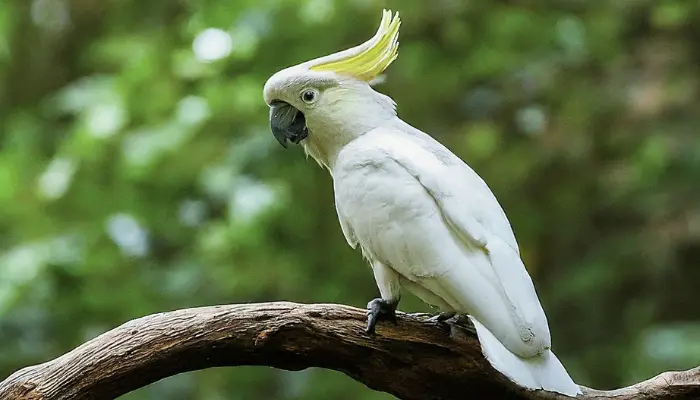
Where to Buy or Adopt an Umbrella Cockatoo
Buying or adopting a pet especially one as unique and demanding as an umbrella cockatoo requires careful consideration and research. Here are some avenues you can explore.
Avian Rescue Centers
Many umbrella cockatoos end up in rescue centers due to their long lifespan and the commitment required to care for them. Adopting from a rescue center not only gives a bird in need a loving home but also often comes with the benefit of the center’s expertise and support.
Pet Stores
Some pet stores may have umbrella cockatoos available for purchase. However, it’s crucial to ensure that the store is reputable, and the birds are well-cared-for and healthy. Avoid supporting pet stores that engage in unethical breeding practices or mistreat their animals.
Online Classifieds
Websites like Petfinder or Craigslist sometimes have listings for umbrella cockatoos available for adoption. Exercise caution when using these platforms and thoroughly vet any potential sellers or adopters.
Some Pros and Cons to Keep Umbrella Cockatoo as a Pet
Here are some pros and cons of keeping an Umbrella Cockatoo as a pet.
| Pros |
Cons |
| Affectionate: Umbrella Cockatoos are known for their affectionate nature and often form strong bonds with their owners. They enjoy cuddling and being petted. |
High Maintenance: Cockatoos require a lot of attention and interaction. They can become bored and develop behavioral issues if they don’t receive enough mental stimulation and socialization. |
| Intelligent: Cockatoos are highly intelligent birds and can be taught tricks and commands. They enjoy mental stimulation and can learn to mimic speech. |
Loud Vocalizations: Cockatoos are known for their loud screeches, which can be disruptive, especially in a household with noise-sensitive neighbors. |
| Social: These birds thrive on social interaction and enjoy being part of the family. They can be very entertaining and provide companionship. |
Destructive Behavior: Cockatoos have powerful beaks and a natural inclination to chew. They can destroy furniture, walls, and other household items if not provided with appropriate toys and outlets for their chewing behavior. |
| Long Lifespan: Umbrella Cockatoos have a long lifespan, often living for 40-60 years or more with proper care. This can make them a lifelong companion. |
Allergies: Some people may develop allergies to bird dander, feathers, or dust, which can be a concern for those considering a Cockatoo as a pet. |
| Beautiful Plumage: Their striking white feathers and majestic crest make them visually appealing pets. |
Long Lifespan: While the long lifespan of Cockatoos can be a pro, it’s also a significant commitment. Owners need to be prepared for the responsibility of caring for a bird for several decades. |
Before getting an Umbrella Cockatoo or any pet. It is important to thoroughly research their care requirements and consider whether their needs align with your lifestyle and capabilities.
People Also Asked

